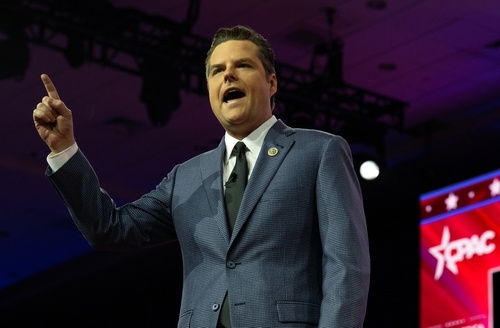In a decisive move, House Republicans blocked the release of a report on Rep. Matt Gaetz, stirring heated debate within Congress. The vote closed at 206 against and 198 in favor, with one Republican supporting the release. The report involved allegations of Gaetz’s misconduct, which he denies, and no charges resulted from a federal investigation.
The Congressional Vote and Its Implications
The House of Representatives faced a critical decision on a Democratic resolution to release a report regarding Rep. Matt Gaetz, which concluded with a narrow defeat at 206-198. Republican Rep. Tom McClintock was the sole member of his party voting in favor of the release, demonstrating the split on this issue. The report compiled by the House Ethics Committee claimed that Gaetz had engaged in inappropriate conduct, including allegations of a relationship with a minor and drug use. These claims did not result in federal charges.
This vote came after a federal investigation yielded no charges against Gaetz, a point that has raised questions on both sides of the political aisle. Republican House Speaker Mike Johnson insisted on adhering to congressional norms as the primary reason behind blocking the release, emphasizing the importance of maintaining legislative traditions in managing ethics investigations. Johnson stated, “I do not believe that that is an appropriate thing. It doesn’t follow our rules and traditions and there is a reason for that.”
Republicans on the House Ethics Committee blocked the release of a report about sexual misconduct allegations against Matt Gaetz, President-elect Donald Trump’s attorney general pick https://t.co/gifz7vhOkj
— CNN (@CNN) November 20, 2024
Diverging Opinions and Political Reactions
Tension within the House has been palpable as Democratic members, led by Rep. Sean Casten, criticized their counterparts for “sweeping these allegations under the rug.” Casten argued that the failure to hold former members accountable sets a dangerous precedent that could potentially encourage resignation as a means to avoid scrutiny. Casten’s comment highlights a growing divide over how congressional ethics should be managed. He stated, “Today, the majority of the House of Representatives took the easy way out.”
As scrutiny increases, Gaetz’s prior nomination by former President Donald Trump for a high-profile Attorney General position has only fueled the controversy. Gaetz later removed himself from consideration to avoid becoming a distraction amidst the national transition. Gaetz was quoted expressing this concern, stating, “My confirmation was unfairly becoming a distraction to the crucial work of the Trump/Vance Transition.”
House rejects Democratic efforts to force release of Matt Gaetz ethics report | AP News https://t.co/9rEZTIVb8L
— Adrienne Bradley (@music4everrrrrr) December 6, 2024
The Aftermath and Future Considerations
The controversy surrounding Rep. Gaetz has persisted, despite no legal action following the federal investigation. His resignation from Congress post-nomination and the subsequent withdrawal has been interpreted by some as a political strategy to avoid the fallout from the allegations.
Trump nominated Pam Bondi for the position, anticipating fewer obstacles during her confirmation. The incident underscores ongoing debates over the balance between accountability and political maneuvering in Congress.
In eras of extreme partisanship, decisions like this one remain points of contention, reflecting broader conversations about ethical standards and political integrity in the nation’s capital. The implications of this vote will likely influence future discussions on congressional ethics and the procedures surrounding such allegations.

